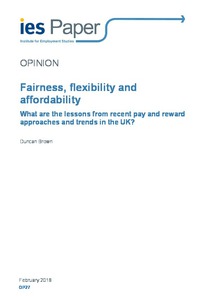Fairness, flexibility and affordability. What are the lessons from pay and reward approaches and trends in the UK?

Institute for Employment Studies, Brighton
IES - Brighton
2018
21 p.
wages ; wage structure ; private sector ; public sector
Opinion Paper
27
Wages and wage payment systems
http://www.employment-studies.co.uk/
English
Statistics;Bibliogr.
"With many UK workers experiencing real wage cuts and in a rapidly tightening labour market, this research paper, authored by IES' head of HR consultancy, Duncan Brown, analyses trends in UK pay and rewards over the past thirty years. In turn, the paper offers guidance to employers and policymakers on three areas that approaches to reward should consider moving forward: low pay, gender pay and total rewards.
In its analysis of trends in reward since the latter part of the 20th century, the paper highlights how there was a move across all sectors towards more market- and performance-related pay and individualised and more flexible packages. Underneath the rhetoric of 'total rewards' and 'best-places-to-work', however, greater risk and variability in pay was transferred to employees and pay differentials escalated as pay fairness took a back-seat.
Since the financial crash in 2008, Brown suggests that many employers have become fixated by low-cost reward models of low pay awards, little pay progression, worse benefits and limited, uncertain working hours. Brown argues that employee engagement and national productivity has suffered as a result, forcing government to intervene on a ‘fairness' agenda, for example taking new measures to address executive pay escalation and low pay levels with the National Living Wage."
Digital
The ETUI is co-funded by the European Union. Views and opinions expressed are however those of the author(s) only and do not necessarily reflect those of the European Union or the ETUI.